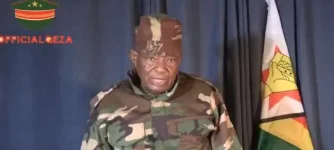War veterans' leader Blessed Geza's call for an uprising against President Emmerson Mnangagwa failed to manifest through street demonstrations. Zimbabweans instead expressed collective dissatisfaction through a nationwide work stoppage, revealing substantial public discontent toward Mnangagwa's administration. This response raises questions regarding whether Geza's campaign should be considered unsuccessful. Measured against his explicit objective—instigating rebellion to depose Mnangagwa—he certainly did not accomplish his goal.
Nevertheless, Geza successfully mobilized public frustration, inspiring a protest form that manifested as numerous Zimbabweans refusing governmental entreaties to attend work. Though Geza's appeal for mass action produced no visible demonstrations, it nevertheless yielded tangible results. Various factors contributed to this particular protest approach. Zimbabweans harbor deep disillusionment with Mnangagwa's leadership, enduring prolonged economic chaos under ZANU-PF rule.
Fear regarding violent suppression from security personnel, coupled with reluctance toward entanglement amid ZANU-PF's internal power contests, likely deterred citizens from direct street confrontation. Evidence suggests people abstained from work because they supported Geza's message rather than rejected it. Many Zimbabweans desire Mnangagwa's departure, regardless of the mechanism through which this might occur. The widespread work stoppage itself demonstrated profound anger toward current governmental leadership.
Strictly speaking, Geza failed at his primary objective—forcibly removing Mnangagwa through a popular uprising. From a broader perspective, the work stoppage represented significant defiance, exposing governmental vulnerabilities and indicating growing dissent. Zimbabweans possess extensive experience utilizing work stoppages as protest mechanisms, recognizing that confrontations with security forces typically result in brutal crackdowns. Geza's message transcended advocating for a single event; it articulated comprehensive criticism against Mnangagwa's governance.
He specifically accused the president of corruption practices, nepotism, and surrounding himself with unscrupulous individuals. Although his appeal for action failed to achieve immediate regime transformation, it succeeded in drawing attention to Zimbabwe's deepening crisis across multiple spheres. The ultimate consequences of these developments remain uncertain. Mnangagwa maintains his position, though his authority appears increasingly tenuous as opposition grows.
Yesterday's work stoppage represents merely one skirmish during a protracted political struggle. Whether Geza's efforts will precipitate greater upheaval or additional pressure against Mnangagwa depends upon forthcoming governmental actions, public sentiment shifts, and the support levels Geza receives from crucial stakeholders. These stakeholders include military officials, opposition parties, and civil society organizations. One certainty emerges from recent developments—Zimbabwe's political climate grows increasingly volatile.
Pressure against Mnangagwa continues mounting steadily. His administration faces significant challenges that show little sign of diminishing during the upcoming months as citizen discontent festers beneath the surface appearances of stability. The political temperature throughout Zimbabwe continues rising, suggesting that Mnangagwa's troubles may escalate rather than subside as economic conditions deteriorate further. Public patience wears increasingly thin regarding governmental performance across multiple sectors.
Nevertheless, Geza successfully mobilized public frustration, inspiring a protest form that manifested as numerous Zimbabweans refusing governmental entreaties to attend work. Though Geza's appeal for mass action produced no visible demonstrations, it nevertheless yielded tangible results. Various factors contributed to this particular protest approach. Zimbabweans harbor deep disillusionment with Mnangagwa's leadership, enduring prolonged economic chaos under ZANU-PF rule.
Fear regarding violent suppression from security personnel, coupled with reluctance toward entanglement amid ZANU-PF's internal power contests, likely deterred citizens from direct street confrontation. Evidence suggests people abstained from work because they supported Geza's message rather than rejected it. Many Zimbabweans desire Mnangagwa's departure, regardless of the mechanism through which this might occur. The widespread work stoppage itself demonstrated profound anger toward current governmental leadership.
Strictly speaking, Geza failed at his primary objective—forcibly removing Mnangagwa through a popular uprising. From a broader perspective, the work stoppage represented significant defiance, exposing governmental vulnerabilities and indicating growing dissent. Zimbabweans possess extensive experience utilizing work stoppages as protest mechanisms, recognizing that confrontations with security forces typically result in brutal crackdowns. Geza's message transcended advocating for a single event; it articulated comprehensive criticism against Mnangagwa's governance.
He specifically accused the president of corruption practices, nepotism, and surrounding himself with unscrupulous individuals. Although his appeal for action failed to achieve immediate regime transformation, it succeeded in drawing attention to Zimbabwe's deepening crisis across multiple spheres. The ultimate consequences of these developments remain uncertain. Mnangagwa maintains his position, though his authority appears increasingly tenuous as opposition grows.
Yesterday's work stoppage represents merely one skirmish during a protracted political struggle. Whether Geza's efforts will precipitate greater upheaval or additional pressure against Mnangagwa depends upon forthcoming governmental actions, public sentiment shifts, and the support levels Geza receives from crucial stakeholders. These stakeholders include military officials, opposition parties, and civil society organizations. One certainty emerges from recent developments—Zimbabwe's political climate grows increasingly volatile.
Pressure against Mnangagwa continues mounting steadily. His administration faces significant challenges that show little sign of diminishing during the upcoming months as citizen discontent festers beneath the surface appearances of stability. The political temperature throughout Zimbabwe continues rising, suggesting that Mnangagwa's troubles may escalate rather than subside as economic conditions deteriorate further. Public patience wears increasingly thin regarding governmental performance across multiple sectors.












